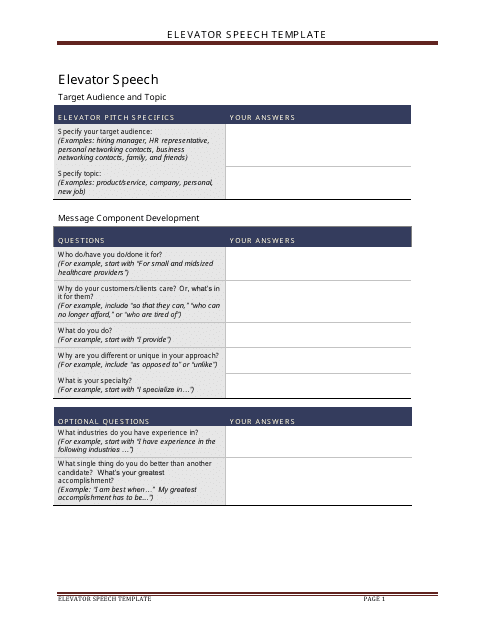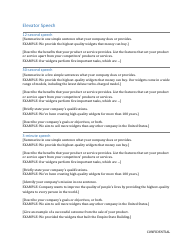Elevator Speech Template
An elevator speech template is a tool used to create a concise and persuasive introduction about oneself or a business. It is typically used in situations where you have a short amount of time to make a memorable impression, such as networking events, job interviews, or business pitches.
FAQ
Q: What is an elevator speech?
A: An elevator speech is a brief, persuasive speech that you can deliver in the time it takes to ride an elevator.
Q: Why is an elevator speech important?
A: An elevator speech is important because it allows you to succinctly communicate who you are, what you do, and why you are unique or valuable.
Q: What should be included in an elevator speech?
A: An elevator speech should include your name, your profession or area of expertise, a brief description of what you do, and any unique or impressive accomplishments or qualities.
Q: How long should an elevator speech be?
A: An elevator speech should ideally be about 30 seconds long, or roughly 75-150 words.
Q: What is the purpose of an elevator speech?
A: The purpose of an elevator speech is to make a memorable and positive impression on the listener, and to generate interest or curiosity in your professional abilities.
Q: How can I make my elevator speech effective?
A: To make your elevator speech effective, practice it regularly, focus on your audience's needs or interests, use clear and concise language, and tailor your speech to different situations or contexts.
Q: Can I use an elevator speech in networking events?
A: Yes, an elevator speech is particularly useful in networking events as it can help you introduce yourself to new people in a concise and impactful way.
Q: Should I memorize my elevator speech?
A: While it's important to be familiar with the content of your elevator speech, it's generally best to avoid sounding rehearsed or robotic. Instead, focus on conveying your message authentically and naturally.
Q: Can I modify my elevator speech for different situations?
A: Yes, it's recommended to modify your elevator speech to suit the specific situation or audience you are addressing. This shows flexibility and adaptability.
Q: What are some examples of elevator speeches?
A: Examples of elevator speeches can vary depending on the individual and their profession, but they typically follow a structure of introducing oneself, stating one's area of expertise, and highlighting unique qualities or accomplishments.





